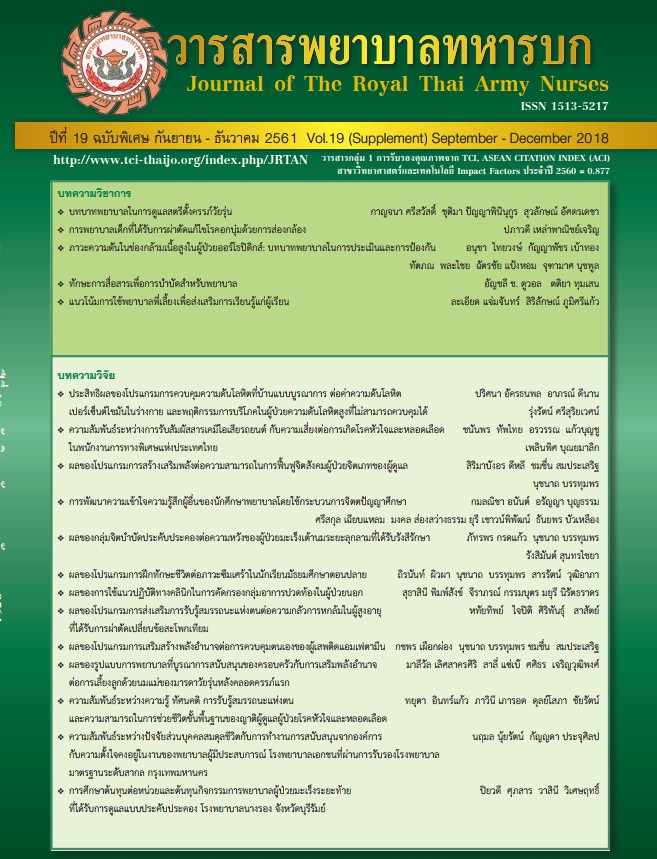The Effect of Family Motivation Interviewing Program on Alcohol Consumption in Schizophrenic Patients with Alcohol Drinking Problem
Keywords:
alcohol drinking problem, alcohol consumption in schizophrenic patients, family motivation interviewing programAbstract
The purpose of this pretest-posttest with a comparison group research design were to compare: 1) mean scores on alcohol consumption of schizophrenic patients with alcohol drinking problem before and after received The family motivational interviewing program (FMI), and 2) mean scores on alcohol consumption of schizophrenic patients with alcohol drinking problem who received the FMI and those who received regular nursing care. The sample consisted of 40 schizophrenic patients with alcohol drinking problem who met the inclusion criteria and received services at the inpatient department. They were matched-pairs with scores on alcohol drinking problem and then randomly assigned to either experimental or control group, 20 subject in each group. The experimental group received the FMI and the control groups received regular nursing care. Research instruments comprised of: 1) FMI 2) demographic questionnaire, 3) the alcohol consumption assessment 4) the stage of change readiness and treatment eagerness scale 5) Alcohol use disorders identification test and 6) Brief Psychiatric Rating Scale. The 1st and 4th instruments were verified for content validity by 5 professional experts. The reliability of the 3rd instrument was reported by Cronbach’s Alpha coeeficient as of .86. Data were analyzed using descriptive statistics, dependent and independent t-tests.
Downloads
References
2. World Health Organization. Action needed to reduce health impact of harmful alcohol use. Retrieved; 2014.
3. Salyers, M. P., Mueser, K. T. Social functioning, psychopathology, and medication side effects in relation to substance use and abuse in schizophrenia. Schizophrenia research 2001; 48: 109-123.
4. Martio, S., Carroll, K., and Kostas, D. Dual Diagnosis motivational intervention: a modification of motivation interviewing for substance-abusing patients with psychotic disorders. Journal of substance abuse treatment; 2002.
5. Darakorn, na P. Successful abstinence of alcoholic patients with co-morbidities. Journal of psychiatric Nursing and Mental Health; 2013. (in Thai)
6. Chaihanit, P. Selected Factors Related to Alcohol Consumption Behavior in Alcohol Dependence with Psychiatric Comorbility. Journal of psychiatric Nursing and Mental Health. 2014; 28 :105-120. (in Thai)
7. Butpunya, Y. The effect of Countinuing Motivational Interviewing Telephone-Based Program on Alcohol Consumption in Person with Alcohol Dependence. Journal of the Royal Thai Army Nurses. 2016; 17: 123-131. (in Thai)
8. Srikosai, S. Effectiveness of motivational interviewing program among patients with schizophrenia and alcohol use disorder. Journal of Mental Health of Thailand. 2010; 54(3): 259-272. (in Thai)
9. Smeerdijk, A. M., Linszae, D., Kuipers, T., and Keet, R. Family Motivational Intervention in Early Psychosis and Cannabis Misuse. In: Lobban, F., and Barrowclough, C. (Eds.). A Casebook of Family Interventions for Psychosis. Chichester: John Wiley & Sons. (2009).
10. Suktrakul, S. The effect of alcohol craving control program on alcohol consumption in alcohol dependence. Doctoral dissertion. Nursing science Faculty of nursing Chulalongkorn University. 2009.
11. Kittiratanapibul, P. Clinical Guideline of Alcohol Management in Psychiatric Hospital. 2006. (in Thai)
13. Tiffany, S. T., Carter, B. L., and Singleton, E. G. Challenges in the manipulation, assessment and interprelation of craving relevant variables. Addiction. 2000; 95 (2): 177-187.
12. Crits-Christoph, P., Markell, H. M., Gallop, R., Connolly Gibbons, M. B., Mcclure, B., and Rotrosen, J. Predicting outcome of substance abuse treatment in a feedback study: Can recovery curves be improved upon. [online]. 2015.
Downloads
Published
How to Cite
Issue
Section
License
บทความหรือข้อคิดเห็นใดใดที่ปรากฏในวารสารพยาบาลทหารบกเป็นวรรณกรรมของผู้เขียน ซึ่งบรรณาธิการหรือสมาคมพยาบาลทหารบก ไม่จำเป็นต้องเห็นด้วย
บทความที่ได้รับการตีพิมพ์เป็นลิขสิทธิ์ของวารสารพยาบาลทหารบก
The ideas and opinions expressed in the Journal of The Royal Thai Army Nurses are those of the authors and not necessarily those
of the editor or Royal Thai Army Nurses Association.






